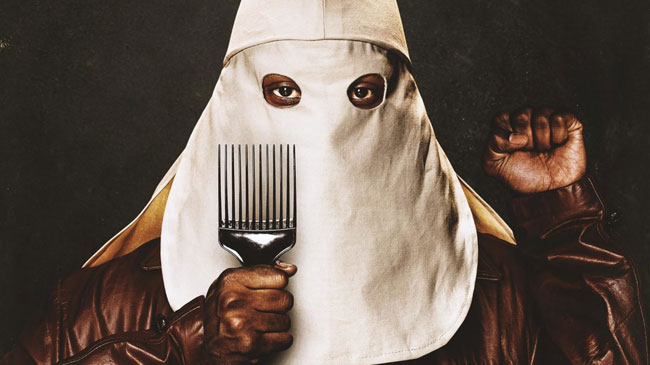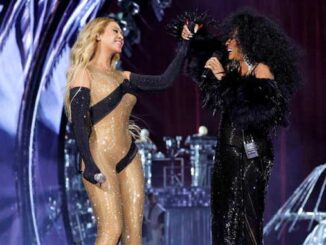
Data Staff Reports
From visionary filmmaker Spike Lee comes the incredible true story of an American hero. It’s the early 1970s, and Ron Stallworth (John David Washington) is the first African-American detective to serve in the Colorado Springs Police Department. Determined to make a name for himself, Stallworth bravely sets out on a dangerous mission: infiltrate and expose the Ku Klux Klan. The young detective soon recruits a more seasoned colleague, Flip Zimmerman (Adam Driver), into the undercover investigation of a lifetime. Together, they team up to take down the extremist hate group as the organization aims to sanitize its violent rhetoric to appeal to the mainstream. Produced by the team behind the Academy-Award® winning Get Out.
BlacKkKlansman is right up there with Do the Right Thing and Malcolm X in the Spike’s Joint pantheon of game-changers. For starters, it gets your blood up about the toxic and enduring power of racism. Based on the true story of Ron Stallworth (John David Washington), the first African-American cop on the Colorado Springs police force, the film shows how Ron managed to infiltrate the Ku Klux Klan and righteously screw with it from the inside. The time is the 1970s, but the filmmaker is not content with dusting off the past. His incendiary movie uses the alt-right cry of “America first!” to rocket his film into the festering, rancid race hatred of the Trump era.
Lee is too much the hellraising stylist to stay inside a documentary box. Starting with a clip from the 1939 Civil War epic Gone With the Wind — the camera rising to meet and then salute a Confederate flag — BlacKkKlansman moves on to Alec Baldwin’s white supremacist, fulminating in a newsreel about a “mongrel nation” generated by “Jewish puppets on the Supreme Court.” Later, we get scenes from D.W. Griffith’s 1915 silent epic, The Birth of a Nation, which prodded audiences to applaud KKK lynchings of blacks. As Lee sees it, the Hollywood propaganda machine has a hell of a lot to answer for.
Stallworth bristles when police chief Bridges (Robert John Burke) sticks him in the records department, where this Afro-wearing rookie is the target of racial insults. His first chance to go undercover comes when he’s assigned to wear a wire and report on a Black Student Union event in which Black Panther ex-leader Stokely Carmichael (Straight Outta Compton‘s Corey Hawkins), a.k.a. Kwame Ture, fires up the crowd. Stallworth flirts with Patrice (Laura Harrier), the BSU president who doesn’t know he is one of the pigs she hates on. His arguments that then-current films such as Shaft and Cleopatra Jones show a good side of blacks in law enforcement are dismissed by Patrice as a “blaxploitation fantasy.”
To prove himself, Ron answers a Klan recruitment ad, phoning in and using his “white voice.” For in-person meetings, Jewish cop Flip Zimmerman (Adam Driver) subs in. Their teamwork is the heart of the film — and both actors knock it out of the park. Washington, son of Denzel, is hilarious on the phone with KKK Imperial Wizard David Duke (a sensational Topher Grace, personifying the banality of evil). As Ron butters up Duke with bigotry, other cops listen in and laugh.
Washington, quietly devastating, conveys the character’s gnawing isolation. And Driver is beyond brilliant as a cop going undercover among haters such as Klansman Felix (Jasper Pääkkönen), who denies the Holocaust. Flip takes a huge risk and disagrees. “Why would you deny it? It was beautiful,” he lies, savoring the word on his tongue and chilling the blood in the process. His performance as a man caught in a poisonous game of pretend is stunning.
BlacKkKlansman, adapted by Lee, David Rabinowitz, Charlie Wachtel and Kevin Willmott from Stallworth’s book, demands the best from everyone, including cinematographer Chayse Irvin, editor Barry Alexander Brown and composer Terence Blanchard. (Having Get Out provocateur Jordan Peele on the producing team doesn’t hurt, either.) Still, the movie breathes Lee as he walks a tightrope over the heroic best and craven worst of humanity. The eruptive violence of the film’s climax, with Ron and Flip caught in the crosshairs of a Klan hit on the BSU, is nerve-shattering. Some might argue that the movie didn’t need a present-day coda of the showdown between white nationalists and protesters in Charlottesville, Virginia; the notorious Trump speech claiming there was “blame on both sides”; or the still-active hatemonger Duke praising the President’s comments. There are times when Lee wobbles, veering into caricature and simplification. But none of this distracts from the fact that this hot-damn triumph — one of the year’s best films — is the impassioned work of a cinema giant who has again found his voice and the power to make it heard.
Recommended For You.




Be the first to comment